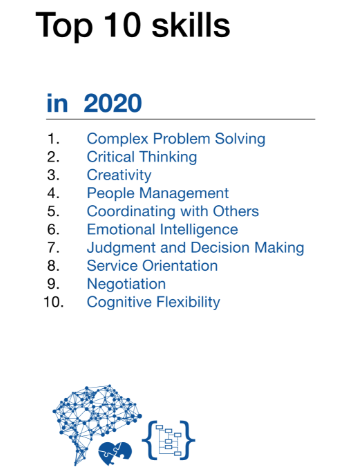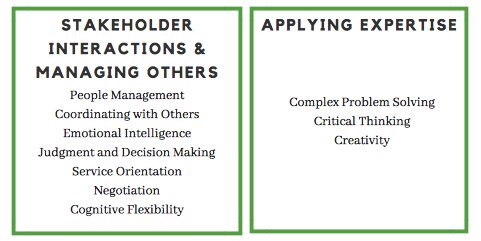One of the greatest challenges to organisations today is the speed of digital change, and in particular, the promise (and threat) of automation. According to McKinsey, workers of the future will spend more time on activities that machines are less capable of. This includes activities such as managing people, applying expertise and communicating with others.
To manage this workplace transition, it's crucial to ensure our employees are trained with the relevant skills for such activities. This not only ensures that employees can take advantage of technology and automation, but that you can form a more effective workplace for the future.
Jobs that will be replaced in the future
Automation can potentially change the way an organisation operates. Many organisations are already looking into automating manual processes and functions such as customer service, sales and processing.
While the impact of automation on employment will vary by occupation and sector, research has found that activities most susceptible to automation are those in predictable environments requiring physical labour. According to McKinsey, up to 78% of predictable physical work can be automated, with other functions such as managing others and applying expertise possibly being automated by up to 9% and 18% respectively. This potentially means a large displacement of labour and disruption in your industry.

Source: McKinsey
Automation is likely to have a lesser impact on jobs with a human aspect, such as managing others and applying expertise. This is also corroborated by the World Economic Forum (WEF). As seen in the graphic below, the skills needed in the future are all soft skills with an emphasis on critical thinking and problem solving. After all, this is something robots are unable to do. This was found after a survey of 350 executives across 9 industries in 15 of the world’s biggest economies.

Source: Future of Jobs report, World Economic Forum
Are we prepared for the change?
Despite this, WEF found that over 33% of the skills listed were not considered important by employers. This is an area that is also neglected by L&D professionals, as there is a greater emphasis today on training employees in technical skills such as coding and data science, in keeping with the pace of digital change, instead of soft skills.
There is therefore a need to fundamentally rethink the nature of jobs and the skills needed by employees. Equipping employees with such soft skills will help ensure employees have the skills and support needed to cope with change, and ensure your organisation has the expertise to cope with technological advances.
Investing in learning for your employees will also give your organisation a competitive advantage. Corporate learning can drive a competitive advantage, according to Forbes. Developing a culture of learning can encourage innovation and help develop capability among your employees. It's also been found that skills and capability development are now at the top of employees and leaders' minds. This can be used to develop a competitive advantage for your organisation.
To start with, here are two areas to focus your learning and development efforts on:

Stakeholder Interactions and Managing Others
In a complex working environment, the art of managing others will be even more critical than before. While physical labour can be automated, this is certainly an area that is unlikely to ever be automated, and is a field you can focus your efforts on.
You can consider training your employees in emotional intelligence, people management and negotiation skills.
I recently completed a coaching session last week on stakeholder interactions and managing others. This particular coachee was in-charge of managing a warehouse that houses many aircraft parts, and was in an organisation where in-house staff worked alongside employees from a commercial vendor.
This created a complex working relationship. The warehouse manager had difficulty motivating a group of employees that did not share the company’s vision and values. These employees did not agree with other motivations such as compensation and benefit as well.
To help them, I tried to get the manager to think of ways to engage his staff at all levels, while helping them to realise their WIIFM (“What’s In It For Me”). This will enlist all parties to work towards a common vision.
Applying Expertise
Having the right expertise is crucial. More importantly, it’s important for employees to think critically about processes, ask the right questions and apply their expertise to solve problems before they happen.
Take the example of the Challenger spacecraft. The Challenger spacecraft exploded in 1986 as the O-ring seals, a part of the spacecraft, were not designed to handle the unusually cold temperatures that existed at the launch. This compromised the integrity of the orbiter, causing it to split apart. This unfortunate incident could however be prevented by the team of engineers behind the spacecraft, if they had thought of the problem in the first place.
While this is an extreme example, the application of expertise (or lack thereof) is obvious. This can have ripple effects on not only their teammates, but also the end user or customer.
On the other hand, having employees that learn and practice their roles with a critical and thinking mind can help build an effective organisation. This is important for the sustainability of any organisation.
To start, you should start to source and equip your employees with these skills. This will help to develop a competent workforce. This is very much like making scotch - something worth drinking today is the result of labour 15 years ago.
Find out how you can incorporate these skills using Realyse, our mobile learning app. We break learning down into bite-sized pieces (just 15 min) to help your adult employees learn these soft skills more effectively! Discover the app below:


